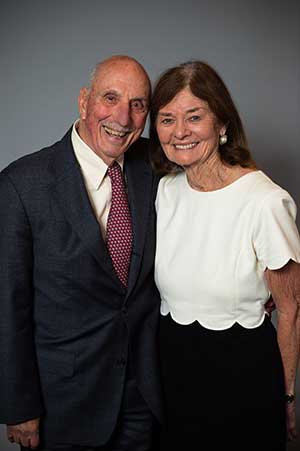Terry Begley, GABELLI ’86, the CEO of corporate banking at PNC Financial Services Group, kicked off the evening. He shared that as the new chair of the council, he’s excited to harness its passion for the University to help Fordham’s new president, Tania Tetlow, with “what she’s trying to accomplish.”
Fordham’s ‘Knights of the Round Table’
The reception served as the first official opportunity for Tetlow to meet the council, a group of successful professionals and philanthropists committed to mentoring Fordham’s future leaders, funding key initiatives, and raising the University’s profile.
“I am so excited to have my own council!” she told them at a reception prior to the mentoring event, which was held in the Lowenstein Center’s 12th-Floor Lounge. “I’ll think of you as Fordham’s Knights of the Round Table: You bring your wisdom, your contribution, your expertise—so much—to Fordham and our students.”
Tetlow said she loves hearing about the ways council members not only “help with the kind of donations that pay forward opportunity” but also engage with “our students quite directly—mentoring them, giving speeches, doing so much for the school.” She added that she’s “eager” to take in their advice and work with them to continue to enhance the Fordham experience for students.
Forge New Connections
Margot Reid, GABELLI ’21, special events and professional development chair of Fordham’s Young Alumni Committee, opened the roundtable discussion portion of the evening by welcoming alumni and parents “back here, back home, to Fordham.” She encouraged the students and recent graduates to really “make the most of this unique opportunity to connect with … the Fordham family” in the room, a group that included graduates from class years spanning five decades.

At 10 tables, each one featuring at least two mentors, attendees shared their stories—from what brought them to Fordham and who in the Fordham community has had the biggest impact on them to how to navigate the workforce while staying true to their values along the way. Guided by discussion prompts, they also delved into how Fordham’s global network of more than 200,000 alumni can help.
Garismar Ramirez, a Fordham College at Rose Hill senior studying neuroscience, asked the mentors at her table how they transitioned to the workforce after college, noting that she feels it would be a big jump to go from worrying about GPA and test scores to performing well every day on the job.
Thomas E. Kelly III, PAR ’11, ’13, said that he did it by learning to be comfortable with ambiguity and trusting in his ability to do a “good job.”
“Don’t be afraid. Don’t be anxious,” he said, adding they should aim to perform with as much excellence as they can.
Kelly, a member of the President’s Council, also encouraged students and recent graduates to use the resources Fordham offers, through the alumni relations office, the Career Center, and the Office of Counseling and Psychological Services, to help overcome any nervousness or anxiety they might have about interviewing and networking.
Trust the Process
Guthrie Garvin, FCRH ’99, a managing director at the real estate and investment firm JLL and member of the President’s Council, said that it’s important not to put too much pressure on yourself to find “the job” you’ll have for the rest of your life.
“I’ve been doing the same thing for 18 years, but it was a pretty circuitous path before that,” said Guthrie, who spent some time in education and sales before turning to real estate. “Find what you think you’re passionate about and jump in, but don’t be afraid to pivot if it turns out that there’s another path that seems more exciting. It’s part of the process.”
Speaking of process, Errol Pierre, GABELLI ’05, senior vice president of state programs at Healthfirst and member of the President’s Council, told the students that internships could help them determine what they’re most passionate about. Thanks to a series of three internships he completed as an undergraduate, he learned what he didn’t like. And “if you can align passion and profession, the sky’s the limit,” he said.
Remember You Belong
Halley Rodriguez, a Fordham College at Lincoln Center senior and a member of Fordham’s Collegiate Science and Technology Entry Program (CSTEP), said she was curious about how to combat imposter syndrome.
In response, Garvin encouraged each of the students at the table to “be confident in yourself and where you should be,” to resist the temptation to “run from what’s a little uncomfortable,” and to remember always that they will bring value to the organization that hires them.
“Constantly tell yourself, ‘I’m supposed to be here,’” Pierre said. “The time it takes to be in your head [worrying]takes you away from performing.”
